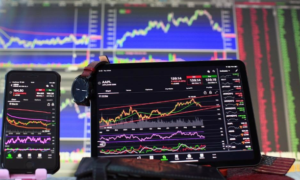Online trading platforms have made investing more accessible than ever. With just a computer and internet connection, anyone can buy and sell stocks, bonds, funds and other financial products from home. This article will explain what online trading is, who it’s suitable for, how it works, key benefits, and tips for beginners.
What is Online Trading?
Online trading allows individual investors to buy and sell securities over the internet using an online brokerage account. Rather than calling your stockbroker or visiting a brokerage office, you can execute trades yourself in seconds using trading software or mobile apps provided by the brokerage firm.
Major online trading platforms include TD Ameritrade, ETRADE, Fidelity, Charles Schwab, Robinhood and Interactive Brokers. They offer retail investors a way to invest in products like:
– Stocks – buy shares of public companies
– Options – contracts to buy/sell stocks at a set price
– ETFs – baskets of assets that trade like stocks
– Bonds – debt securities issued by corporations or governments
– Mutual funds – professionally managed portfolios
– Forex – currency pairs and CFDs
– Cryptocurrency – digital assets like Bitcoin and Ethereum
Is Online Trading Right for You?
Online trading appeals to active investors and traders who want control over their portfolio. It’s ideal for those who enjoy analyzing the markets and making frequent trades based on short-term opportunities.
Benefits like low broker commissions and easy access from home allow you to trade affordably on your schedule. You can build a diversified portfolio across asset classes and markets.
Active trading does come with risks and learning curves. It may not suit passive long-term investors or those new to the stock market. Always match the investing style to your goals, time horizon and risk tolerance.
Understanding Online Trading
Online brokerages provide a trading platform where you can analyze market data, place orders, manage risk, and track your portfolio. Here are key elements of online trading:
Real-time quotes and charts – View live streaming bid/ask prices and historical charts to identify trading opportunities.
Trading accounts – Open different account types like IRA, joint, trust, margin and international accounts.
Order types – Place market, limit, stop and conditional orders to trade as you want.
Research and analysis – Use screening tools, trading signals, financial news, and research reports to inform decisions.
Risk management – Set stop losses, trailing stops and take-profit orders to control downside.
Mobile access – Monitor and trade from smartphones and tablets through brokerage apps.
How Online Trading Works
Follow these basic steps to get started with online trading:
- 1. Choose an online broker based on account features, trading tools, investment products, platform, customer service, pricing and reputation.
- 2. Open your brokerage account online in minutes. Approval is fast and funding can come from a bank account, wire transfer, check or debit card.
- 3. Log into your account dashboard to access the trading platform, quotes, charts, screening tools, account management and education resources.
- 4. Analyze the markets using technical indicators to identify trading opportunities that match your strategy.
- 5. Place buy and sell orders for stocks, ETFs, options etc. Set stop losses and take-profit limits.
- 6. Monitor order status and account balances in real-time as trades are executed.
- 7. Manage your portfolio by selling at profit targets or cutting losses. Reinvest proceeds from profitable trades.
Key Benefits of Online Trading
Why do millions of individuals trade online? These are the top advantages:
Affordable – Online brokers offer discounted commissions and account minimums. Trading costs have declined sharply in recent decades.
Accessibility – Trade 24/7 from anywhere with a computer or mobile app. Much more convenient than calling a broker during market hours.
Control – Make all buy and sell decisions yourself for your strategy. Don’t rely on a paid advisor.
Technology – Use advanced trading platforms, real-time quotes, charting and screening tools.
Choice – Trade thousands of stocks, funds, ETFs, forex and cryptocurrency from one account.
Liquidity – Enter and exit positions instantly thanks to electronic markets and high daily volumes.
Diversification – Expand into new asset classes and global markets to balance risk.
Research – Leverage online broker research, ratings, data and education to make informed trades.
Tips for Beginner Traders
Here are some key tips to get started with online trading:
- 1. Define your trading goals and risk tolerance. Will you aim for short-term profits or long-term growth? How much risk can you handle?
- 2. Open a practice account to learn the trading platform risk-free. Paper trade before putting real capital on the line.
- 3. Start small position sizes as you gain experience. Only allocate 1-5% of capital per trade initially.
- 4. Follow a trading plan for consistent execution. Set entry/exit rules, risk parameters and position sizing ahead of time.
- 5. Use stop-loss orders on every trade to automatically limit downside if the market moves against you.
- 6. Develop your skills in technical analysis to identify favorable entry and exit points in price trends.
- 7. Reinvest profits from winning trades while cutting losses short on unprofitable trades. Stick to your plan.
- 8. Review account performance periodically to assess what’s working and improve your strategy over time.
- 9. Maintain an overall portfolio for long-term growth along with short-term trading accounts for diversification.
- 10. Keep emotions in check when trading. Don’t let fear or greed cloud your judgments.
Get Started with Online Trading
Online trading empowers retail investors like yourself to take control of your portfolio. With a brokerage account, you can invest across markets from home on your schedule. Follow the tips outlined to trade responsibly, manage risks, and maximize your success. With knowledge and discipline, you can achieve your financial goals through online trading.


































